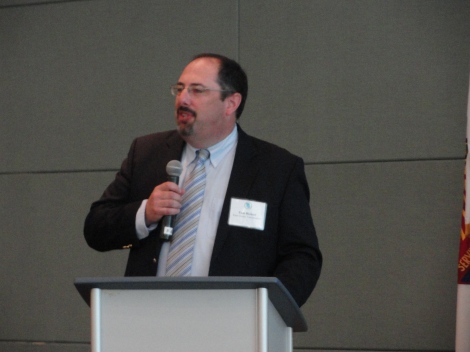
Kane’s Truck-Permit Pilot Program Might Present Regional Solution

Tom Rickert, deputy director of the Kane County Division of Transportation, gives an overview of the new Kane County truck-permit system.

Tom Rickert, deputy director of the Kane County Division of Transportation, gives an overview of the new Kane County truck-permit system.

Tom Rickert, deputy director of the Kane County Division of Transportation, gives an overview of the new Kane County truck-permit system.
The state of Illinois is a bit off course when it comes to truck traffic and regulation.
There are plenty of reasons for that, but one is that there are just so many units of government in Illinois — nearly 7,000 of them, according to 2012 figures from the U.S. Census Bureau.
And that means trucking agencies have to navigate through miles of red tape when trying to figure out the right routes and what fees they have to pay for taking those “roads less traveled.” The topic came up last week at the seven-county economic summit, hosted by DuPage County and held Tuesday, July 22, at the IBEW Local 701 Union Hall in Warrenville.
The hard truth is that some units of government haven’t even set permit fees, similar units of government often have very different permit fees, and local-government regulations are hard for trucking companies to figure out and hard to find — which leads to missed payments.
The seven-county consortium — made up of Cook, DuPage, Kane, Kendall, Will, Lake and McHenry — is working with private-sector and public-private agencies to come up with a regional solution. The program goal, as described by Doug Whitley, executive director of Supply Chain Innovation Network of Chicago (SINC), is to establish “a modern, transparent and coordinated system of local truck regulations and route information.”
Whitley said such a system would:
- Enhance the Chicago region’s reputation as the logistics capital of North America.
- Grow the regional economy.
- Improve the business climate by streamlining the regulatory environment.
The question posed at Tuesday’s summit was, “How do you go about that?” for the 501 regulatory agencies in the region.
And the answer — or at least, a model that might be used by a regional agency — comes from Kane County.
In his part of the presentation, Kane County Division of Transportation Deputy Director Tom Rickert showed how Kane County has attacked the problem.
Rickert looked at at the situation in Kane County, where there are just 49 “oversize/overweight” permit jurisdictions to deal with. They include:
- 1 – The Interstate Toll Highway Authority
- 1 – The state of Illinois
- 1 – Kane County
- 16 – Townships in Kane County
- 30 – Municipalities in Kane County
Rickert started by communicating with the 16 Kane County townships, meeting with township road commissioners and getting them to buy in to the same fee structure as Kane County. KDOT then was able to secure 16 separate intergovernmental agreements that put in place the same permit-issuance procedures as Kane County, under Kane County’s operation. The permitting began April 1.
The way it works is, Kane County acts as the permit issuer, and townships use the same fee schedule. Townships end up getting 80 percent of the fees, and 20 percent goes to the county for its services. The fees are distributed quarterly, and copies of the permits are sent to the townships for their record-keeping.
That’s still a win-win for townships, because they don’t have to spend staff time on the permitting process. For some townships, it meant a fee increase, and for those that weren’t collecting fees at all, the result was new revenue. Of course, townships still have to keep Kane County informed about road and bridge postings, so that the county can communicate that information to trucking companies.
Through KDOT’s efforts, 17 regulatory-permit agencies were boiled to one. KDOT now is looking at striking similar arrangements with some of the rural municipalities.
In less than four months since Kane County began the program, the response from oversize/overweight trucking has been very positive, Rickert said. There have been very few complaints about fees for township permitting. Truckers appreciate having to make fewer phone calls and other coordination to get route approval.











